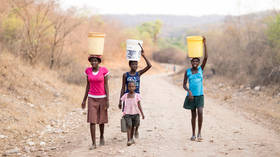African state issues hunger alert

Zimbabwe declared a national state of disaster on Wednesday, as a severe drought continues to affect the African nation. President Emmerson Mnangagwa said the country needs $2 billion in aid to feed millions facing hunger.
Mnangagwa told a press conference in Harare that due to very low rainfall more than 2.7 million people in the country will not have enough food to put on the table this year.
“No Zimbabwean must succumb or die from hunger,” Mnangagwa said. The president then formalized the official response, stating: “To that end, I do hereby declare a nationwide State of Disaster, due to the El Nino-induced drought.”
He also noted that “Preliminary assessments show that Zimbabwe requires in excess of $2 billion towards various interventions we envisage in our national response.”
According to Mnangagwa, the government would prioritize winter cropping to boost reserves, and work with the private sector to import grains.
In southern Africa, Zimbabwe is the third country to formally designate a drought a national disaster, after Malawi and Zambia.
El Nino is a naturally occurring weather phenomenon associated with a disruption of wind patterns that means warmer ocean surface temperatures in the eastern and central Pacific.
Most provinces in landlocked Zimbabwe have seen crop failure since November, with hotter areas writing off harvests of corn and other staples.
According to the World Meteorological Organization (WMO), the latest El Nino is one of the five strongest occurrences ever recorded. It reached a peak in December but should still result in above-normal temperatures until May over almost all land areas, the organization is warning.
Humanitarian agencies, including the World Food Programme, have described the hunger situation as ‘dire,’ calling for more aid.













